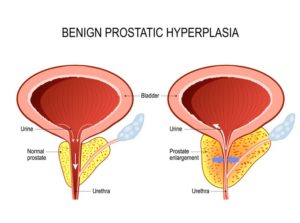 Benign prostatic hyperplasia (BPH) is a fancy way to say enlarged prostate. It is the most common cause of an enlarged prostate, with over half of men over the age of 51 and 90 percent of men over 80 having it.
Benign prostatic hyperplasia (BPH) is a fancy way to say enlarged prostate. It is the most common cause of an enlarged prostate, with over half of men over the age of 51 and 90 percent of men over 80 having it.
BPH can lead to urinary problems among men such as frequency and urgency or feeling as if you haven’t completely emptied your bladder.
Advertisement
Throughout a man’s life, there are two growth phases of the prostate, the first being puberty and the second around the age of 25.
BPH does not lead to prostate cancer, but BPH and prostate cancer may exist together.
Symptoms of BPH include weak urinary stream; needing to stop and start urinating several times; urgency, leakage, or dribbling or urine; a sense of incomplete emptying of the bladder; and more frequent urination, particularly at night.
Lifestyle changes can be a great way to control and manage your BPH and allow you to live a healthy life. Here are seven lifestyle changes you can integrate into your daily life to better manage your BPH.
7 Lifestyle Habits to Manage BPH
- Practicing yoga, meditation, or other relaxation techniques can be useful as being stressed or tense can interrupt urine flow and lead to greater frequency.
- Use the bathroom often to ensure you are completely emptying your bladder. Also, ensure you are urinating before heading out on long drives or trips and especially urinate prior to bed. You may consider double voiding. Once you are done urinating, try again to see if anything else comes out.
- Certain over-the-counter medications may aggravate BPH. This includes certain decongestants and antihistamines. Speak to your doctor about ingredients to avoid to prevent irritation.
- Avoid consuming liquids up to three hours before bed. You should also avoid caffeinated beverages and alcohol, as these can stimulate the kidneys to produce more urine.
- Perform Kegel exercises to strengthen pelvic muscles and prevent leakages and dribbles. Contract your Kegel muscles and hold for 10 seconds, release, and repeat.
- Eat healthy foods to support prostate health such as whole grains, seeds, fruits, vegetables, and fish.
- If symptoms are negatively impacting your way of life or you are having a hard time managing them, then always speak to your doctor about treatment options that are available.
Also read:
- Natural remedies and exercises for enlarged prostate (benign prostatic hyperplasia)
- Enlarged prostate complications: urinary retention, hematuria, bladder stones, and urinary tract infections
